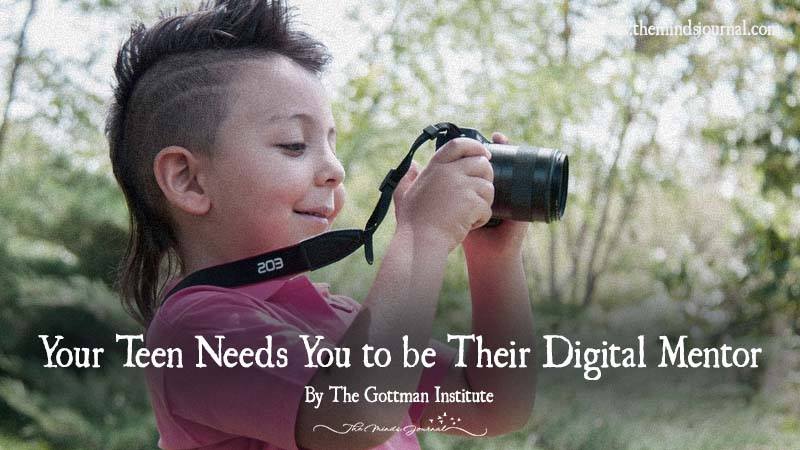Teen Needs You To Be Their Digital Mentor
By Sinead Smyth, LMFT
In the 2016 documentary Screenagers: Growing Up in The Digital Age, we see families grapple with what may be the biggest parenting issue of our time: managing screen time. This issue can feel overwhelming for parents of teens, especially when we see the negative effects of screen time reflected in our relationship with them.
As a compulsive email checker and online news reader, I understand the pull that screens can have. As an adult, however, I can re-focus and take care of business when needed. Priorities have been established, and the reasoning part of my brain is fully developed. My responsibilities in life are different than my 15 year old’s, as they should be.
MIT’s Raising Teens Project has identified ten critical developmental tasks that teenagers need to make a successful transition to adulthood. These include developing and understanding emotions and relationships, applying abstract thinking and decision making and self-control, forming values and belief systems of their own, and establishing their identities.
Normal adolescent development requires our kids to do much of this work separate from us in order to be autonomous adults. This is a lot to accomplish while the teen brain is still under construction. For adolescents today, much of that work is done online, at warp speed, with teens being exposed to all kinds of material that impacts their view of relationships, emotions, attention level, values, and beliefs.
With the pervasive influence of technology in their lives, how can we ensure that our teens are meeting these developmental goals in ways that support instead of harming them?
An Emotion Coach is a Digital Mentor
Through the work of Dr. John Gottman and others, the value of Emotion Coaching as a parenting style has been shown to be associated with better child outcomes. Emotion Coaching involves parents being aware of their child’s emotion, empathizing, validating, and helping the child label the emotion, then setting limits if necessary while exploring strategies to solve the problem at hand.
While it may be relatively easy for parents to empathize with their seven-year-old daughter who feels left out by friends, it can be very challenging to listen calmly to the intensely negative emotions of a teenager, especially when those emotions are directed at us. My client Mora says of being mom to 16-year-old daughter Ellie, “I’m Little Red Riding Hood waiting for the Wolf to show up.”
What we know from the research is that despite the change in their size, tone, and attitude, our teens really need us to be with them during these vital years of development. If we have empathy for our teens’ emotions, effectively communicate with them, and strike the right balance between flexible control and allowing freedom, they will be more resilient, better able to focus and self-soothe, be academically stronger, and grow to be emotionally intelligent adults.
A dilemma for parents nowadays is how to be those good Emotion Coaches to our kids regarding their use of technology, which influence so many parts of their lives. And even though our teens are separating from us in many ways, it is essential that we continue to stay engaged with them in order for them to grow into the adults we want them to be. For families who have opened the door to smartphones and laptops, that engagement means getting involved with what they are doing online.
In a 2015 survey of more than 10,000 North American parents, researcher Alexandra Samuel found there to be three types of digital parents, each with its own distinct attitude towards technology.
1. The Enablers
These parents allow their teens to make their own decisions regarding screen time and access to devices.
2. The Limiters
These parents take every opportunity to switch off screens.
3. The Digital Mentors
These parents are more likely to talk with their kids about how to use technology or the internet responsibly, and are more likely to connect with their kids through technology. They are paying attention to what their teens are interested in online and are finding ways to connect with them there and guide them on responsible use.
Samuel’s research suggests that children of limiters are actually the most likely to engage in problematic behaviors online, such as accessing porn or chatting with strangers, probably because they haven’t been helped to have healthy habits.
In other research, it appears that children of enablers can develop a whole host of problems too, ranging from lack of ability to focus to decrease in empathy for others.
So, it seems that being a digital mentor parent mirrors what we’ve known for some time from the Emotion Coaching literature: by being interested in what our teens are into online, validating, not automatically reacting, getting their input and setting limits where needed, we can actively shape our kids’ online skills and experiences. Just like Goldilocks and the Three Bears, we are neither too strict, nor too loose, we can be “just right.”
I’ve had many parents of grown kids tell me that if they could have a do-over for the teenage years, they would have picked their battles more carefully. Since many of today’s battles are fought over our teens’ use of tech, here are some ways you might be able to pick your battles and be an Emotion Coach in the digital age.
Read 6 Ways Parents Can Communicate Better With Their Teens (According To Teens)
Negotiate Rules
Remember our job description has changed from manager to consultant, which means that we need to listen, accept our teen’s individuality, and be open to some negotiation on rules regarding tech use.
Keep A Positive Perspective
Try to keep an overall positive perspective in your relationship with your your teen. Research shows that in good relationships, the majority of interactions need to be positive, even when difficulties arise.
Read Kids Activities at Home: Ways To Keep Kids Busy Without Much Screen Time
Soothe Yourself
When problems escalate with your teen, be the parent! This means actively trying to calm yourself by taking a break and focusing on something else for a while.
Soften Your Start-Up
Since teenagers can be masters of deflecting and turning around an argument, try and use good communication skills to ensure that your concerns are more likely to be heard. Use a soft start-up like, “I’m concerned about your screen time. When can we have a conversation about it?” instead of “You always have your phone out at dinner.” Avoid ridiculing or minimizing their viewpoint. This will only harm your overall relationship with your teen, even if you do “win” the argument.
Have A “Tech Talk
Delaney Ruston, creator of Screenagers, recommends that families have frequent, short calm discussions about tech in a non-confrontational way. She calls it “Tech Talk Tuesday.” This makes room for intentional conversations where all points of view can be heard. It’s a great way to both keep the conversation calm and keep connected with your kids in a positive way.
If you are truly concerned about addiction to technology, here are two available tools you may want to discuss with your teen: Center for Internet Addiction and Twenty Questions for Video Gaming Addiction.








Leave a Reply
You must be logged in to post a comment.